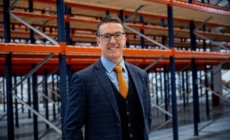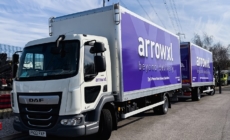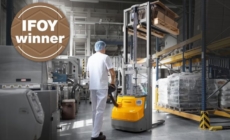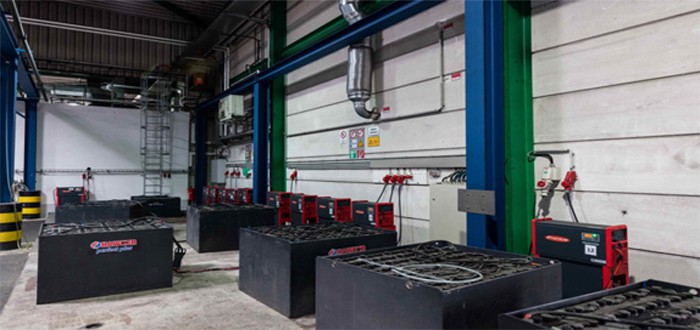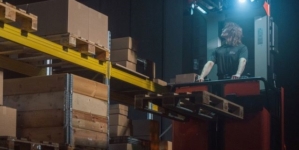-
ROSSLARE EUROPORT TARGETS HEALTH & SAFETY WITH CAMERA TELEMATICS PARTNERSHIP - 2 days ago
-
Landmark Study Reveals Wearable Robotics Significantly Boost Safety and Efficiency in Industrial Environments - July 24, 2024
-
Visku Tackle The Retail Seasonality Challenge One Pallet At A Time - July 22, 2024
-
KAMMAC AND BERGEN LOGISTICS STRENGTHEN FASHION & LIFESTYLE SERVICES IN THE UK - July 19, 2024
-
TENTBOX EXTENDS PARTNERSHIP WITH ARROWXL TO SUPPORT INCREASING DEMAND - July 17, 2024
-
The Perfume Shop improves customer journeys while driving profitability in partnership with Scurri - July 17, 2024
-
ZEROMISSION SECURES £2.3M ($3M) INVESTMENT TO ACCELERATE ELECTRIC FLEETS - July 16, 2024
-
BCMPA CELEBRATES SUCCESS OF 2024 CONFERENCE - July 15, 2024
-
Best of the Best: Jungheinrich Celebrates Triple International Award Win - July 12, 2024
-
GOPLASTICPALLETS.COM CALLS ON NEW CHANCELLOR RACHEL REEVES TO CONSIDER PLASTIC PACKAGING TAX REFORM - July 10, 2024
Beverage company’s forklift truck fleet now consumes 30 percent less energy.
Austrian beverage group Ottakringer operates its own logistics subsidiary, Trinkservice GmbH, which is responsible for managing the company’s forklift truck fleet. In the Lower Austrian town of Bad Vöslau, where Vöslauer Mineralwasser AG (also owned by Ottakringer) is based, fleet manager Bernd Jimmy Breymann and his team have equipped a fleet of around 80 electrically powered forklift trucks with new battery charging technology from Fronius. The Selectiva battery charging systems with the cost-effective Ri charging process reduce energy consumption by up to 30 percent, extending the service life of the traction batteries. A detailed analysis of the charging data and the changeover to a battery pool have provided additional savings.
Beer, lemonade, mineral water, mixed beverages, wines and spirits: there is virtually nothing that Ottakringer Getränke AG doesn’t produce. Founded as a brewery in the Viennese district of Ottakring in 1837, Ottakringer is now the only listed beverage company in the country, the majority of which is still family-owned. Ottakringer’s product range consists of some of the most popular national drinks brands, including the traditional Ottakringer beer and Vöslauer mineral water, which is well known to international consumers as well. In 2015, the Group achieved a record sales figure of almost four million hectolitres and a turnover of 232.1 million euros. A total of 874 people are employed by the Ottakringer Group at its various locations.
To bring these delicious beverages to market reliably, quickly and in optimum condition, Ottakringer runs its own subsidiary, Trinkservice GmbH, which specialises in storage and transport services. Trinkservice is not only responsible for distribution, but also for the internal logistics of the finished goods at all the Group’s sites. Particularly large volumes are processed at the headquarters of Vöslauer Mineralwasser AG in the Lower Austrian town of Bad Vöslau: in 2015, the company sold more than 2.2 million hectolitres of water in bottles of various sizes, ranging from 0.33 to 1.5 litres.
Continually reducing the energy consumption of intralogistics operations
Energy efficiency is an important issue for the entire Ottakringer Group, including the Vöslauer subsidiary. Back in 2013, the company introduced an energy management system in accordance with ISO 50001, which has since been updated to comply with the new Austrian energy efficiency legislation. The goal is to continually decrease energy consumption and CO2 emissions. “A modern, well thought-out intralogistics system is a central component of this plan,” reports Trinkservice fleet manager Bernd Jimmy Breymann, who is responsible for logistics operations at all Ottakringer sites. “After all, a large part of the company’s energy consumption can be attributed to the internal transport of goods.”
In Bad Vöslau, Vöslauer operates a fleet of around 80 electrically powered forklift trucks – from platform stacking trucks to heavy-duty frontlifts with a load capacity of eight tonnes. Most of these vehicles are manufactured by Still, the company’s preferred long-term forklift truck supplier. Operations are spread over three shifts, running 24 hours a day. To ensure high availability of the forklift truck fleet, all larger vehicles have back-up batteries, which are charged at a central charging station. The drivers remove the heavy 80 volt batteries from the vehicle using an indoor crane, move them carefully to the storage area and replace them with fully charged batteries from the station. This process takes only a few minutes and the forklift truck is soon ready for use again.
“Previously, we used different battery charging systems from different manufacturers – some with 50 Hz transformer technology and some with high frequency technology,” explains Breymann. Unfortunately, this solution had its disadvantages. “The devices were operated in different ways and the charging times varied, meaning that the batteries were often charged too much or too little.” This had a negative impact on the performance and availability of the forklift truck fleet. Above all, the high energy consumption of the devices was a thorn in the side of the Trinkservice managers. “Conventional charging technology often leads to overcharging of the battery and thus considerable energy loss,” reports Breymann. “Of course this didn’t fit in with the plan to increase our energy efficiency.”
Increased energy efficiency through a new charging process
Breymann therefore decided to equip the fleet in Bad Vöslau with new, state-of-the-art charging technology. The company issued a call for tenders and came across Selectiva battery charging systems from the Austrian manufacturer Fronius: these devices boast the new Ri charging process, which adapts to the requirements of each battery according to its age, temperature and state of charge. “Each charging process is therefore unique and has an individual, perfectly tailored characteristic,” explains Alexander Thier, Area Sales Manager at Fronius. “This has two main advantages: energy loss is minimised during charging, which in turn reduces energy consumption. Gentle charging also extends the service life of the batteries.”
Since summer 2015, Trinkservice has been using more than 20 Selectiva devices in the 16 kW power category at Vöslauer. To simplify operation and increase safety in the charging station, the devices are mounted on special bases. “This makes the display easier to read and the charging cables can be stowed away safely,” explains Thier. Furthermore, the devices are also equipped with an external start/stop mechanism. This optional feature has a pilot contact to prevent sparking if the charging plug is disconnected prematurely during the charging process. “Oxyhydrogen explosions during charging are therefore a thing of the past,” adds Thier.
Analysis shows further potential savings
Once the battery charging systems had been in operation for a few months, Fronius experts paid Vöslauer another visit – this time with the aim of analysing all the charging data collected thus far and identifying any further optimisations. The Selectiva devices are equipped with a USB interface for this purpose, which allows historical charging cycles to be easily exported in detail. In addition, Fronius has developed a solution for analysing this data and revealing further potential savings in the shape of the I-SPoT Viewer analysis tool. “The analysis performed at Vöslauer showed that the charging times for the devices could be extended without a problem,” explains Thier. “This results in an even gentler and more energy efficient charge for the batteries, further reducing the operating costs.”
Fronius has evaluated further potential savings in collaboration with the fleet management team. The conclusion was to replace the fixed assignment of batteries and battery charging systems with a variable battery pool. “Each battery was previously assigned its own charger”, recalls Breymann. “This was necessary, however, as not every battery charging system was compatible with every battery”. This is no longer the case thanks to the battery pool solution: the Selectiva devices are flexible and can charge different batteries with different voltages and capacities. A display also shows the user how long to the minute that the connected battery has been fully charged, allowing the forklift truck driver to select the battery that has been fully charged for the longest and is therefore the coolest. “Switching to the battery pool has increased the service life of the batteries considerably and we have managed to reduce the number of back-up batteries needed,” enthuses Breymann. After all, these batteries can cost several thousand euros each and are a considerable cost factor.
Pilot project as a new benchmark
The use of Fronius technology has already paid off for Vöslauer, with 30 percent less energy being consumed when charging the traction batteries compared to previous devices. CO2emissions have also been significantly cut thanks to the gentler charging process. “This is an important step in the continuous improvement of our energy efficiency levels,” emphasises Breymann. The service life of the expensive batteries has increased considerably through the gentle charging process, meaning that the procurement costs of the devices have quickly been paid off. The system in Bad Vöslau is a pilot project for Trinkservice and a model for other company sites: “Our experiences with Fronius battery charging systems have been so positive that we would like to use them at other Ottakringer Group sites in the future,” explains a satisfied fleet manager. www.fronius.com/intralogistics





